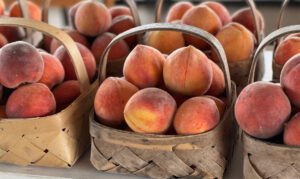A while back, I found myself on a rural backroad that is now a blacktop, but I remember when it was nothing more than red dirt that left a swirl of dust behind the back end of a car or marred its wheels in mud that stuck to the whitewall tires like putty.
Of all my childhood summers spent as the daughter of a tri-vocational preacher (Daddy was a farmer, a mechanic and, on Sundays, he held forth as the pastor of a rural congregation), I realized that it was that church — Town Creek Baptist — that I recall most vividly for an entire week of twice-daily services during one particular revival. I was 9.
I don’t recall the particular songs we sang that year or what scriptures were preached. Surely, “Just As I Am” was sung and some man preached at least one sermon from the book of John.
I have long forgotten the dresses I wore. I am certain it was hot. It always was. I am positive that souls were saved and, two weeks later, baptized in Town Creek near Mitchell and Betty Stancil’s simple farm house where the newly-converted changed out of their dripping clothes and combed down their wet hair.
What I have never forgotten, what I was reminded so strongly of as I traveled that road, was the hospitality and the food that filled that week of 14 services. Two meals a day. After morning service then again before evening church.
There was a time when rural church congregations took exceptional pride in keeping their preacher and his family fed well. This was particularly important when summer revivals came around.
Long before revival began, women started scheduling when they could have the preachers to eat. There was always a visiting preacher who “helped” in revival so both preachers, wives and children were included. I, for some reason, was usually the only child.
Revival at Town Creek fell the first week of August, so summer gardens were coming in. The church women filled their tables with a bounty of vegetables and fresh meats such as country cured ham and chickens they had grown. They picked peaches and blackberries for cobblers and filled the table of the farm houses — all with opened windows and screen doors — with hot steaming biscuits.
The Heltons. The Dockerys. The Nixes. The Ledfords. The Cantrells. The Etrises. They threw open their doors and welcomed us in. Each man of the house always asked Daddy to say grace and he always prayed, “Oh, Lord bless the hands that have prepared this food.”
At the Ledfords’ house on a lovely knoll from which the church could be viewed, after a noontime meal, the adults carried kitchen chairs out to the front yard and set them up under an enormous oak tree whose strong limbs covered the yard. I sat on the ground and listened as the adults talked. I was perfectly content.
The Cantrells had girls my age and an egg farm. They were hard-working people who gave far more than they ever took. In a little side bedroom of their little farmhouse, the girls and I went through their big brother’s record collection and discovered Loretta Lynn’s “Don’t Come Home A-Drinkin’” which we played over and over.
I stayed the afternoon to play and that night, after I helped them get up eggs, we kids walked to church. A summer’s rain had turned the red dirt road into an oozing mess of yuck. We took off our shoes and went merrily on our way.
When we arrived, Mama was standing in the church yard, talking. She wasn’t angry when she saw the mud that covered me nearly to the knees.
“Get over there to the spigot and wash up before you go in church.”
I washed away the mud but the red stain clung stubbornly. It clung just like the precious memories of those precious people still cling to my heart.
[Ronda Rich is the best-selling author of “Let Me Tell You Something.” Visit www.rondarich.com to sign up for her free weekly newsletter.]












Leave a Comment
You must be logged in to post a comment.